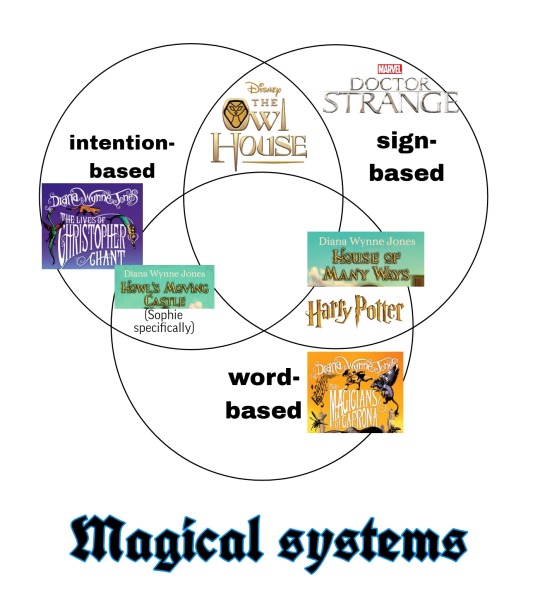#I feel like Howl who wrote his thesis on spells and charms
Explore tagged Tumblr posts
Text
Let's talk
Magical systems
I have been considering this for some time, because I'm reading, watching and writing things that have magic in them, and I have managed to single out three categories of magics that seem basic:

Intention-based refers to the type of magic where you picture the result and it just happens. No specific rituals or magical words required.
Word-based refers to spells, when a specific spell-word yields specific results.
Sign-based is a somewhat broad category, which includes magical signs and sigils, runes, chalk circles, ingredients required to work a specific spell or a special movement that you have to do to perform magic.
And here are a few examples that came to my mind as I was making this, and I do encourage additions and speculation:

Let's elaborate!
Okay Diana Wynne Jones has probably written every single one of these magical systems, it's just that they're too confusing for me to classify each and every instance, because there are hardly any descriptions. It doesn't help that all her stories are more or less like So they usually do magic this way BUT our protagonist has their own way. But Christopher Chant aka Chrestomanci, for example, is very clearly an intention-based enchanter, because he just makes things go his way. In The Magicians of Caprona they specifically sing spells, and their quality depends on how well they are sung (written spells are still word-based spells, by the way). In House of Many Ways doing a spell is described in detail (which doesn't mean much since Charmain has her way of making magic anyway, but it's there, to show how spells were supposed to work all along), and it has ingredients and special actions and words to say or write. Then, since it's all the same universe as Howl's Moving Castle, I'm just singling out Sophie for intention+words, because what she uses is not necessarily spells, but she just magically talks things into being a certain way, so they also kinda are.
Harry Potter had brave attempts at a straight-forward wagical system, but then some spells require unnecessarily difficult and precise wand movements to move a fricking feather, while you just point at someone to unalive them. Still, sort of falls into this crossover of categories, I GUESS.
Doctor Strange was the only example of sign-based magic that came to my mind, but I think it's a very good example. They literally wave their hands around in a certain way and make glowy things out of thin air. Amazing. Wish I could do that.
The Owl House, in my opinion, is a prime example of intention+sign, because it literally said so in the show. I think it was when Luz was trying to teach Eda and Lilith wild magic, because there are only four basic sigils, and they make so many combinations, yes, but you can ALSO shape the outcome by picturing what shape you want your spell to take. And I think they do pretty much the same thing when they draw those circles and imagine what they want to happen, so here it is.
Addition that's not on the graph: Carrionites from that one Doctor Who episode about Shakespeare are word-based. That was the whole plot point.
Anyway, here's my take on a topic which I mostly cleared up into a system for myself, and I would love to see what others think about it. Maybe there's a secret fourth thing I have somehow overlooked... And I would also love to see people add their fandoms to the pile :)
#I feel like Howl who wrote his thesis on spells and charms#magical systems#Harry Potter#Howl's moving castle books#hmc book#house of many ways#diana wynne jones#chrestomanci#the owl house#doctor strange#I hope there's something to speculate about in this post
173 notes
·
View notes